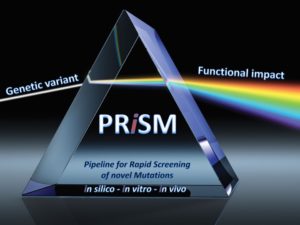PRiSM Screen
Next generation sequencing (NGS) has become the method of choice to identify the presence of pathogenic mutations in children with a neurodevelopmental disorder. Recent studies suggested that a possible pathogenic genetic mutation can be identified in the majority of individuals with intellectual disability. However, many of the identified variants are genetic variants of unknown significance (VUS). To  establish whether these variants are pathogenic, independent confirmation is needed. The PRiSM (Pipeline for Rapid in silico/in vitro/in vivo Screening of Mutations) is developed as a functional genomics screen to test the pathogenicity of such variants. Although we can make use of many specific biochemical read-outs to establish the pathogenicity of a variant (eg, kinase assays, ubiquitin assays) the core assays of the PRiSM screen are hypothesis-free: biological information about the protein is not a prerequisite to assess the pathogenicity of the variant. This allows us to assess whether variants in protein domains for which the precise function is unknown or cannot be assessed biochemically, are pathogenic. Moreover, we can test variants in proteins for which no biological information is available at all. Although PRiSM is primarily used to assess the effect of missense mutations, occasionally we also investigate frameshift, non-sense or splice-site mutations. Typically, we are also able to tell if a mutation acts as a loss of function (LOF), or gain of function (GOF) mutation
establish whether these variants are pathogenic, independent confirmation is needed. The PRiSM (Pipeline for Rapid in silico/in vitro/in vivo Screening of Mutations) is developed as a functional genomics screen to test the pathogenicity of such variants. Although we can make use of many specific biochemical read-outs to establish the pathogenicity of a variant (eg, kinase assays, ubiquitin assays) the core assays of the PRiSM screen are hypothesis-free: biological information about the protein is not a prerequisite to assess the pathogenicity of the variant. This allows us to assess whether variants in protein domains for which the precise function is unknown or cannot be assessed biochemically, are pathogenic. Moreover, we can test variants in proteins for which no biological information is available at all. Although PRiSM is primarily used to assess the effect of missense mutations, occasionally we also investigate frameshift, non-sense or splice-site mutations. Typically, we are also able to tell if a mutation acts as a loss of function (LOF), or gain of function (GOF) mutation
